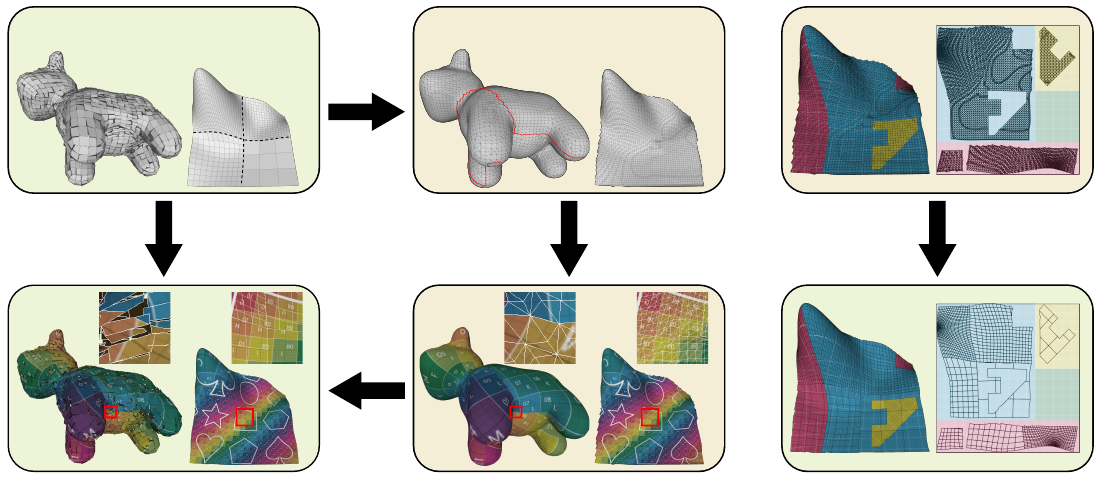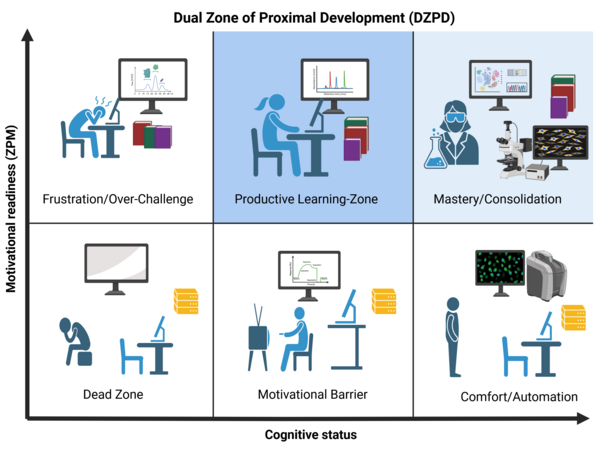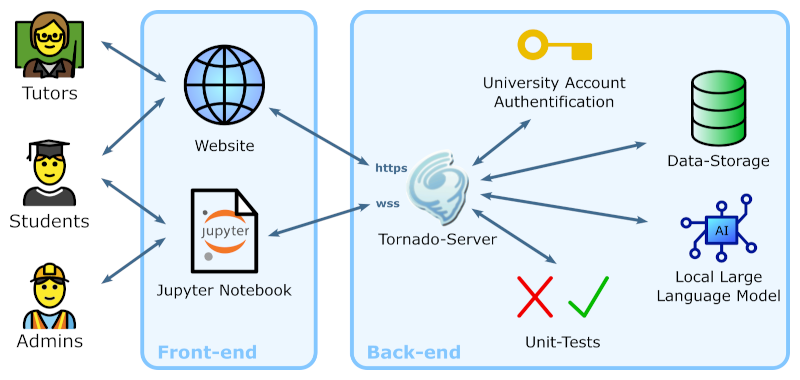Papers by Dipl. Inform. Alexander Schier
Robust Curve Embedding in Inconsistent Surface Meshes
Abstract
We present a robust algorithm for embedding feature curves into possibly inconsistent meshes and polygon soups. Unlike prior approaches, which transfer only vertex positions, our method embeds entire edges as geodesic paths on a mesh proxy, enabling reliable detection of intersections between projected edges and feature curves defined on the proxy. By avoiding explicit edge-edge intersection tests, the algorithm remains numerically stable even on poorly conditioned meshes. We apply the method to texture transfer, where projected edges are cut at UV seams defined on a mesh proxy in order to reproduce texture chart boundaries of that proxy exactly and thereby eliminate distortions that previous methods could only mitigate heuristically. To construct the merged mesh that embeds feature curves into the inconsistent mesh, we first employ a non-manifold halfedge structure that supports incremental insertion of paths and seams without requiring complete faces, and then reconstruct a manifold mesh consisting of both geodesic segments and feature edges. We demonstrate the effectiveness of the approach in the texture transfer setting by comparing against prior heuristics, and illustrate its applicability to engineering tasks by transferring feature curves between meshes that are collections of disjunct NURBS patches.
In: SSRN Preprint
2026
From Answer Engines to Learning Partners: A Dual-ZPD Design Framework for AI-Supported Learning
Abstract
Generative AI's function as a frictionless "answer engine" creates a paradox in educational HCI: the very tools that can enhance intellect may also weaken it by allowing users to circumvent crucial cognitive processes. This risks creating a "hollowed mind"—knowledge that is broad but superficial, and a user experience that diminishes learner agency. The convenience of cognitive offloading introduces a motivational challenge that traditional cognitive scaffolding cannot address. We argue that designing genuine human-AI partnerships in learning requires moving beyond cognitive support to motivation-aware scaffolding. This paper provides a toolkit for building motivation-aware AI systems. At its core is the Dual Zone of Proximal Development (DZPD), a conceptual framework building on foundational work in educational psychology. We introduce an overarching design principle, concrete design principles, illustrative archetypes, and examples of measurable indicators. These conceptual tools offer essential guidance for the next wave of empirical HCI research in education.
To be published in: Proceedings of the 2026 CHI Conference on Human Factors in Computing Systems
2026
PyEvalAI: AI-assisted evaluation of Jupyter Notebooks for immediate personalized feedback
Abstract
Grading student assignments in STEM courses is a laborious and repetitive task for tutors, often requiring a week to assess an entire class. For students, this delay of feedback prevents iterating on incorrect solutions, hampers learning, and increases stress when exercise scores determine admission to the final exam. Recent advances in AI-assisted education, such as automated grading and tutoring systems, aim to address these challenges by providing immediate feedback and reducing grading workload. However, existing solutions often fall short due to privacy concerns, reliance on proprietary closed-source models, lack of support for combining Markdown, LaTeX and Python code, or excluding course tutors from the grading process. To overcome these limitations, we introduce PyEvalAI, an AI-assisted evaluation system, which automatically scores Jupyter notebooks using a combination of unit tests and a locally hosted language model to preserve privacy. Our approach is free, open-source, and ensures tutors maintain full control over the grading process. A case study demonstrates its effectiveness in improving feedback speed and grading efficiency for exercises in a university-level course on numerics.
Improving Digital Communication with Personalized Expressive Characters in Interactive Comic Scenes
Abstract
We introduce an interactive comic chat system that seamlessly integrates visual storytelling with text-based real-time interaction to enhance digital communication. Our approach employs generative AI to create interactive comics, supporting the easy creation of personalised characters and scenes, dynamically adapting these personalised characters and environments to chat content and additional user input, automating the generation of visually coherent comic panels, and overcoming the limitations of previous comic chat systems that are limited to pre-defined graphical elements. We propose algorithms for generating characters and panel backgrounds using generative AI, incorporating facial expressions, poses and thematic elements, and effectively placing characters and speech bubbles in comic panels. The continuous changes in character details and comic scenes provide visual cues that help viewers perceive the sequence of comic panels as a fluid and ongoing action, making the scenes feel dynamic and alive. In addition, the chat system incorporates interactive elements such as chat bots and themed rooms to increase user engagement. In an extensive user study, we show that our novel system significantly enhances users’ ability to convey emotions and engage in meaningful interactions online, and that users appreciate the wide range of self-expression options and personalised characters that allow for more nuanced communication. The versatility of generative AI approaches makes our platform suitable for a wide range of applications beyond mere chatting, including education, reducing language barriers and character-driven role-playing games.
In: SSRN Preprint
2024
Discrete exterior calculus for meshes with concyclic polygons
In: Computer Aided Geometric Design,
Vol 101,
2023
Abstract
Discrete exterior calculus (DEC) is a numerical method for solving partial differential equations on meshes with applications in computer graphics, numerics, and physical simulations. It discretizes PDEs in a way such that important integral theorems hold exactly instead of being approximated. The drawback of the method is that it has strong requirements on the mesh. While the narrow range of admissible meshes mentioned in the original work could be widened, current methods still exclude an essential category of meshes, i.e., meshes with concyclic triangle pairs. Such meshes are common, as many synthetic meshes, e.g., triangulations of CAD models, handcrafted 3D models, and even results of surface meshing algorithms, contain such triangle pairs. Our paper describes an approach that allows us to use meshes with arbitrary triangulations that may contain concyclic triangle pairs by defining DEC operators for concyclic polygons.
Fast Texture Mapping for Triangle Soups using Electrostatic Monopole Field Lines
Abstract
We present an efficient approach for the parameterization of triangle soups. Our technique tackles the problem by first approximating the triangle soup by a watertight 2-manifold offset mesh proxy. By establishing point correspondences between the triangle soup and the shape proxy by tracing electrostatic field lines in time O(kn) instead of O(kn^2), we can transfer properties computed on the surface, such as UV-coordinates even for large input meshes. The technique can process large triangle soups by replacing the computational intensive physical calculations by approximations developed initially for large-scale physical simulations. Thus it is possible to decrease the time complexity of the initial charge distribution algorithm from O(n3) to O(n). We demonstrate our method on a multitude of challenging triangle soups and focus on the transfer of UV-coordinates during our experiments. An intensive run-time analysis and a comparison of our results to state of the art techniques in standard modeling tools concludes our study.
Upwind Schemes for Scalar Advection-Dominated Problems in the Discrete Exterior Calculus
In:
Transport Processes at Fluidic Interfaces,
pages 145-175,
Springer International Publishing, 2017
Abstract
We present the discrete exterior calculus (DEC) to solve discrete partial differential equations on discrete objects such as cell complexes. To cope with advection-dominated problems, we introduce a novel stabilization technique to the DEC. To this end, we use the fact that the DEC coincides in special situations with known discretization schemes such as finite volumes or finite differences. Thus, we can carry over well-established upwind stabilization methods introduced for these classical schemes to the DEC. This leads in particular to a stable discretization of the Lie-derivative. We present the numerical features of this new discretization technique and study its numerical properties for simple model problems and for advection-diffusion processes on simple surfaces.
Discrete Exterior Calculus im maschinellem Lernen
Diplomarbeit, Universität Bonn, 2014








